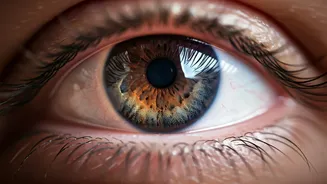Makeup: Hidden Threats
Daily makeup application, while enhancing appearance, can introduce a range of risks to eye health. Mascara, eyeliner, eyeshadow, and other products used
near the eyes can be breeding grounds for bacteria if not handled and stored properly. This is particularly true if products are old or shared. Using expired products increases the risk of eye infections like conjunctivitis (pinkeye). Additionally, the application process itself can cause problems. Rubbing or tugging at the eyelids when applying or removing makeup can cause irritation, dryness, and even microscopic damage to the cornea. The preservatives in makeup can also trigger allergic reactions in sensitive individuals, leading to redness, itching, and watering of the eyes. To mitigate these risks, always wash hands before applying makeup, avoid sharing products, replace eye makeup every three months, and remove all makeup thoroughly before sleeping. Consider using hypoallergenic products if you have sensitive eyes.
Contact Lenses: Careful Handling
Contact lenses, providing convenience for vision correction, come with their own set of potential problems. Improper handling and maintenance of contact lenses significantly increase the risk of eye infections. Failure to clean and disinfect lenses as directed by an eye care professional can allow bacteria, fungi, and amoebas to thrive. This can lead to serious eye infections, including corneal ulcers, which can cause permanent vision loss. Wearing lenses for longer than recommended or sleeping in them also increases the risk. Contact lenses can reduce the amount of oxygen reaching the cornea, making it more susceptible to infection. Furthermore, using tap water to rinse or store lenses is dangerous, as tap water may contain microorganisms that can cause serious infections. Always use sterile contact lens solution, follow the cleaning instructions provided by your eye doctor, and remove lenses before sleeping. If you experience any redness, pain, or blurred vision, remove your lenses immediately and consult an eye care professional.
Common Harmful Habits
Several common habits related to makeup and contact lens use can further endanger eye health. Rubbing your eyes, whether from irritation or simply out of habit, can introduce bacteria and cause damage. This action can scratch the cornea or dislodge contact lenses. Applying makeup on the inner waterline of the eye (also called the 'tightline') is a practice that can increase the risk of infections, as it brings makeup directly in contact with the meibomian glands, which produce oil to lubricate the eyes. Another harmful habit is the use of old or contaminated makeup brushes and applicators, as these can harbor bacteria that can be transferred to the eyes. Additionally, failing to wash hands before inserting or removing contact lenses or applying makeup also facilitates the transfer of germs. The combination of these practices, along with underlying health conditions or environmental factors, can compound the risks and lead to serious eye problems. Vigilance and adopting safe practices are crucial for eye health.
Preventative Measures Explained
Several proactive steps can be taken to minimize the risks associated with daily makeup and contact lens use. Prioritizing hygiene is fundamental. Thoroughly washing hands with soap and water before touching your eyes, applying makeup, or handling contact lenses is critical. Regular replacement of eye makeup products, such as mascara and eyeliner, is also essential. Experts advise replacing eye makeup every three months to minimize bacterial growth. Using high-quality, hypoallergenic makeup products can help mitigate allergic reactions and irritation. When using contact lenses, it is crucial to follow the cleaning and storage instructions provided by your eye care professional. Regular eye exams can help detect potential issues early on, allowing for prompt treatment. Choosing appropriate makeup and lens products suited for sensitive eyes is also a good preventative measure. Lastly, being attentive to the signs of eye irritation, like redness, itching, or blurry vision, and seeking professional help is vital if these symptoms persist.













